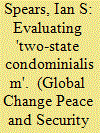| Srl | Item |
| 1 |
ID:
131347


|
|
|
|
|
| Publication |
2014.
|
| Summary/Abstract |
At a time when Israelis and Palestinians are gathering in Washington to consider peace in the Middle East, most attention is focused on the idea of a one-state or, more likely, two-state solution. A number of scholars, however, have recently developed a third approach which has been appropriately referred to as a 'two-state condominialism'. This approach seeks to overcome the liabilities of the two existing approaches to solving the Middle East conflict while offering a number of its own advantages. Surprisingly, in spite of the similarities among their proposals, none of the authors make reference to, or even acknowledge each other. This article reviews these papers as a collective and considers whether they offer a realistic opportunity for peace in the Middle East.
|
|
|
|
|
|
|
|
|
|
|
|
|
|
|
|
| 2 |
ID:
153871


|
|
|
|
|
| Summary/Abstract |
This article looks at smuggling among the Awlad ‘Ali Bedouin in the borderland of Egypt and Libya. Smuggling is understood as a transgressive economic practice that is embedded in the wider social, political and cultural connectivity of the Awlad ‘Ali. This connectivity transgresses state borders, collides with conceptions of state sovereignty, territory and citizenship. In addition, it has a greater historical depth than the respective post-colonial states, and is in many respects more vital than these. During the regimes of Gaddafi and Mubarak the economic productivity and political stability in the borderland was based on the shared sovereignty between politicians and cross border traders of the Awlad ‘Ali and the Egyptian and Libyan state. During and after the Arab spring and particularly in the subsequent civil war in Libya local non state sovereignties that operate across borders have gained significant empowerment and relevance. The article argues that shared sovereignty between state and non-state formations, between centres and peripheries, and between the national and the local level, is a central feature of the real practice of African governance and borderland economies.
|
|
|
|
|
|
|
|
|
|
|
|
|
|
|
|